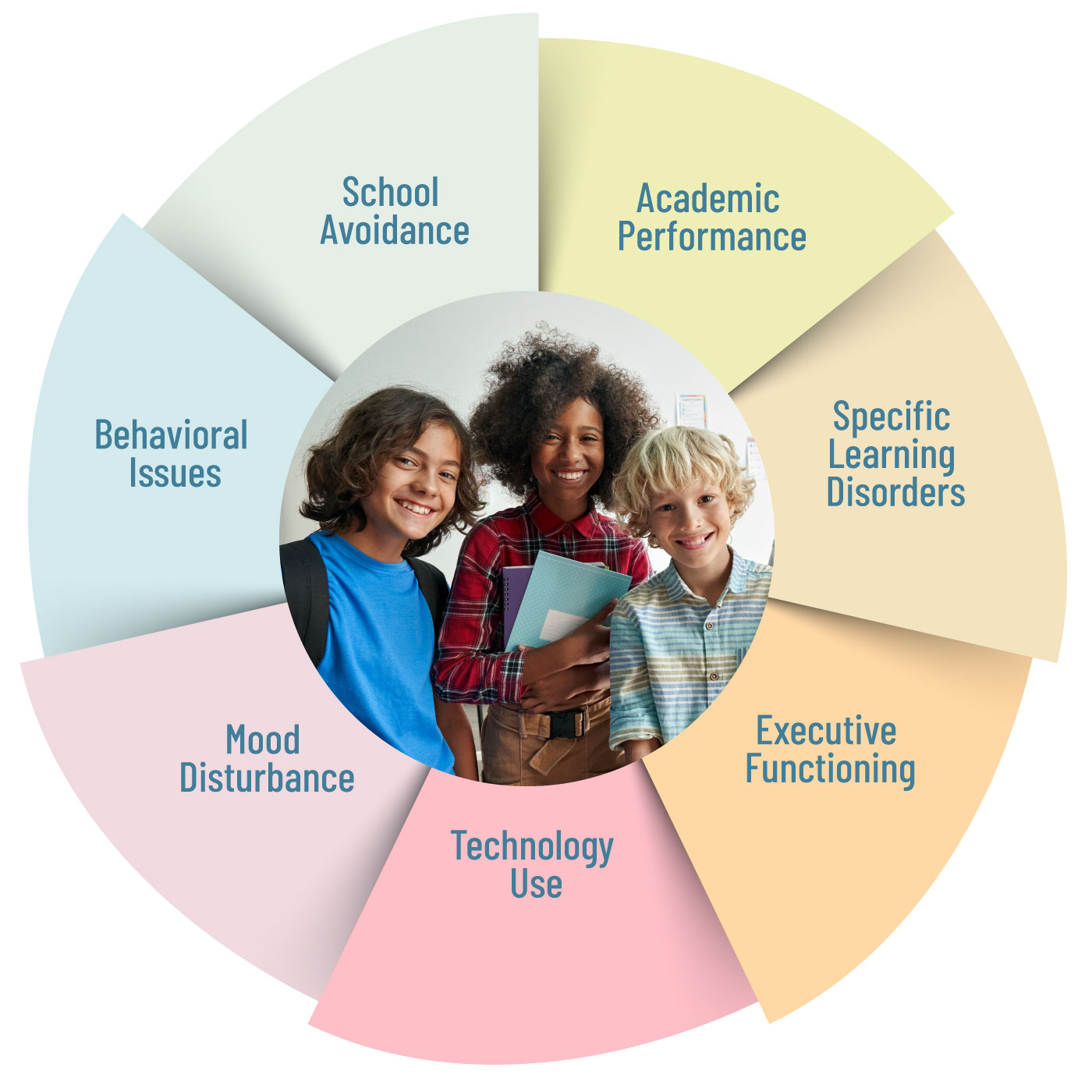Populations Served
Children & Adolescents, 4-21
Emotional issues, particularly at an early age, can significantly impede a student’s educational and social development. Some families may consider taking the child or young adult outside the public school system and enrolling them in a specialized school or therapeutic residential or wilderness program. At The Shoreline Therapy Center, through our Connections Program, we keep them in their public school and/or home community where they can learn to function in within their own “normal” environment.
Population served: for Children & Adolescents, 4-21

Academic Performance
Struggles with content, work completion, grades reflecting potential; remaining in classes/on task; attention deficits.
School Avoidance
Poor attendance/truancy, struggles with morning routines, limited family support, trauma.
Behavioral Issues
Acting out, rule breaking, oppositional/defiant with faculty; peer relational problems—difficulty making/keeping friends, arguments/fights with others.
Executive Functioning
Organizational challenges, time management deficits, improving multi-step procedural efficiency.
-
Academic Performance
Struggles with content, work completion, grades reflecting potential; remaining in classes/on task; attention deficits.
-
School Avoidance
Poor attendance/truancy, struggles with morning routines, limited family support, trauma.
-
Behavioral Issues
Acting out, rule breaking, oppositional/defiant with faculty; peer relational problems—difficulty making/keeping friends, arguments/fights with others.
-
Technology Use
Excessive computer/video game access—“screen time.”
-
Executive Functioning
Organizational challenges, time management deficits, improving multi-step procedural efficiency.
-
Specific Learning Disorders
Imperfect abilities/disruptions around spoken and written language, reading and writing, basic math calculations, perception/thinking.
-
Mood Disturbance
Social/performance-based/generalized anxiety; depression, low self-esteem; emotional regulation/frustration tolerance.

School Avoidance
Poor attendance/truancy, struggles with morning routines, limited family support, trauma.
Academic Performance
Struggles with content, work completion, grades reflecting potential; remaining in classes/on task; attention deficits.
Specific Learning Disorders
Imperfect abilities/disruptions around spoken and written language, reading and writing, basic math calculations, perception/thinking.
Executive Functioning
Organizational challenges, time management deficits, improving multi-step procedural efficiency.
Technology Use
Social/performance-based/generalized anxiety; depression, low self-esteem; emotional regulation/frustration tolerance.
Behavioral Issues
Acting out, rule breaking, oppositional/defiant with faculty; peer relational problems—difficulty making/keeping friends, arguments/fights with others.
Mood Disturbance
Social/performance-based/generalized anxiety; depression, low self-esteem; emotional regulation/frustration tolerance.
Children and adolescents can face many issues as they grow and develop. Some are afflicted with conditions such as ADHD, depression or OCD, among others, which can impede their development. Others can find school or other settings daunting and resist conforming. No matter what the cause, The Shoreline Therapy Center has the people, experience and programs to effectively treat whatever condition is adversely affecting our child and adolescent clients.
| TOPIC | ISSUE | SOLUTION |
| Academic Performance | A student’s academic performance often suffers due to underlying issues, i.e. ADD, Depression, etc. | Determine and treat the underlying cause. |
| Specific Learning Disorders | Pre-diagnosed learning disorders can affect beyond the student’s capacity to learn. | Treat the underlying learning disorder and the peripheral conditions. |
| Executive Functioning | The inability to deal with life’s daily tasks — organizing a day, doing homework, cleaning, cooking. | Our CONNECTIONS program provides personal coaching to help with these critical activities. |
| Mood Disturbance | Can be as a result of depression and/or withdrawal from peers and activities. | Depending upon the actual condition, the solution can be individual therapy, family therapy or the CONNECTIONS program. |
| Behavioral Issues | Students can “act out” when frustrated and/or can be afflicted with a condition such as OCD, ADD, ADHD or bipolar disorder. | The CONNECTIONS program can help them “re-engage” with the family, school and/or work environments. |
| School Avoidance | Underlying causes can be depression, ADD, bipolar disorder and others. | Treat the underlying cause either through individual/family therapy or the CONNECTIONS program. |
| Technology Use | An inordinate attachment to technology either social media, gaming or a variety of other types of content. | Determine the underlying cause and treat with individual/family therapy or via the CONNECTIONS program |
Client Stories
Our Connections Program has a definite structure, but this structure gives us the freedom to creatively address a variety of clients with a variety of issues. As you can see in the client stories below, we treat each client as a unique individual and the programs we design to address their issues are customized to meet their individual needs. Click on one of the links below to see actual programs and schedules for different types of individuals:
-

Kelsey, 6-Year-Old with Behavioral Issues »
-

Erik, a 10-Year-Old on the Spectrum »
-

Scott, 15-Year-Old Transitioning Back After Wilderness Program »
-

Christie, a 17-Year-Old Boarding School Student Demonstrating Self-Harming Behavior »
-

Angela, an 18-Year-Old College Student Suffering from ADHD »
-

Paige, a 19-Year-Old Struggling to Find Direction »
-

Derek, 25-Year-Old Failing to Launch »
-

Mike, a 35-Year-Old with Autism »
Exclusions, Limitations and Caveats
Since we are not a residential facility, there are certain situations or cases we cannot take. However, if you are uncertain about whether we can help address your situation, do not hesitate to call us. If your situation is one we cannot treat, we would be happy to direct you to a therapist or program that can. The following are situations we cannot treat:
- Actively Aggressive Individuals: Displaying a propensity to cause harm or violence towards self, others or property.
- Active Substance Abuse/Addiction: While we work with many recreational users, we do not treat those with a serious dependence on any substance.
- Unsafe Home: We do not treat victims of abuse, violence or neglect.
- Medical Intervention: We cannot provide medical intervention or dispense prescription medication or treat wounds or injuries, nor provide ambulation or hospitalization.
